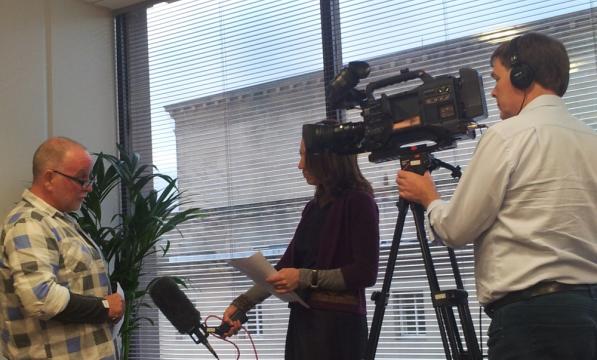Road Justice local campaigners receive media training

The training was held at the Sheffield offices of Slater & Gordon Lawyers, the sponsors of the Road Justice campaign.The Slater & Gordon Road Traffic Incident team attended the first half of the day’s training and were on hand to answer any legal questions.
Information about the goals of the campaign and why this campaign is so desperately needed was given in a presentation by Rhia Weston, the Road Justice coordinator.
Training content
An important element of the local campaigner’s role is to attend court hearings of drivers who have injured or killed cyclists, to report back to CTC on the outcome of these hearings, and to notify journalists of upcoming hearings. Campaigners were instructed on court etiquette, on how to gather information on impending court cases and were given advice on writing effective press releases for journalists.
Road Justice campaigners who have attended court hearings in the past have been interviewed for local television and radio to speak of the campaign’s goals and their response to court outcomes. Campaigners learnt tips for being interviewed for television and radio and had the opportunity to put those tips into practice by doing pre-recorded interviews.
The training was given by Etholle George, a TV presenter with the BBC in the Eastern Region who has over 20 years’ experience of working in media and Steve Feeney, who is a professional cameraman with considerable TV experience. Advice on being interviewed for radio was given by CTC’s press officer, Laura Raymond, who worked as a journalist and news reader in local radio for 20 years prior to joining CTC.
The CTC training day lucidly explained the aims and strategy of the Road Justice campaign. It then put us in the hands of legal and media professionals who trained us in a friendly, non-threatening and supportive atmosphere in how best to get our message across and build support for our demands. Thanks for a very professionally organised, informative, inspiring and confidence-building training day."
Julia Podziewska, Road Justice local campaigner
The role of local campaigners
The role of the Road Justice local campaigner is to:
- Liaise with local representatives of the police, prosecution services and courts;
- Raise local road safety concerns with decision makers and local media;
- Raise the campaign profile by engaging with local media;
- Track local stories of injustice;
- Attend court cases of drivers who have injured and killed cyclists.
To become a Road Justice local campaigner, please fill out this short form.
The Road Justice campaign
The aim of the campaign is to make the roads safer for cyclists and all other road users by making the justice system take a tougher approach to bad driving. The campaign is urging the police to combat bad driving by enforcing road traffic law and thoroughly investigating all collisions resulting in serious injury and death. Currently, there is a petition running on the campaign website calling for improvements to roads policing. Please add your name to the petition, if you haven't already done so.
The campaign also wants the police and prosecution services to make charging and prosecution decisions appropriate to the severity of an offence and, in particular, not to downgrade ‘dangerous driving’ to ‘careless driving’. We want the judiciary to use their power to impose tougher sentences for driving offences and to favour long-term driving bans. The campaign also wants the whole of the justice system to provide victims of road crashes and bereaved families with adequate support and information. Visit the Road Justice website to find out more.

